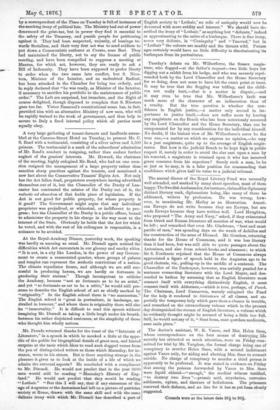Mr. Fronde returned thanks for the toast of the "Interests
of Literature," in a speech in which he mocked a little at the appe- tite of the public for biographical details of great men, and hinted surprise at the taste which likes to read such doggrel verses from the pen of distinguished writers as those which Macaulay, for in- stance, wrote to his sisters. But is there anything strange in the pleasure it gives us to look at the inside of a life of which we admire the external aspects? He concluded with a compliment to Mr. Disraeli. He would not predict that in the year 3000 men would still be reading " Macaulay's History of Eng- land." He would not predict that they would be reading " Lothair." "But this I will say, that if any statesman of the age of Augustus or the Antonines had left us a picture of patrician society at Rome, drawn with the same skill and with the same delicate irony with which Mr. Disraeli has described a part of English society in Lothair,' no relic of antiquity would now be devoured with more avidity and interest." We should have de- scribed the irony of "Lothair," as anything but "delicate," indeed as approximating to the satire of a burlesque. There is fine irony, never very delicate, in "Coningsby " and " Tancred," but in " Lothair " the colours are muddy and the thrusts wild. Futuna ages certainly would have no little difficulty in discriminating its burlesques from its portraitures.


































 Previous page
Previous page